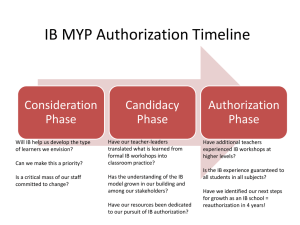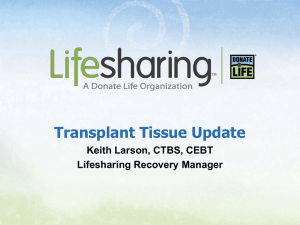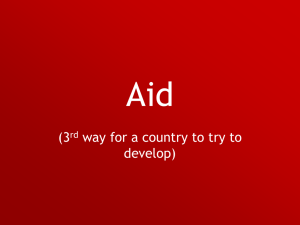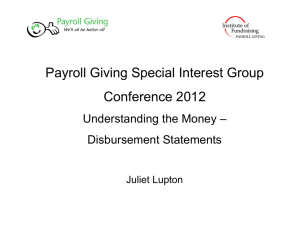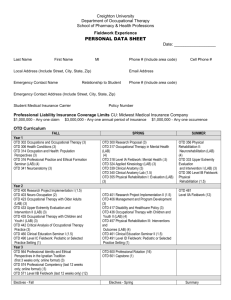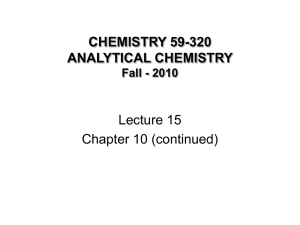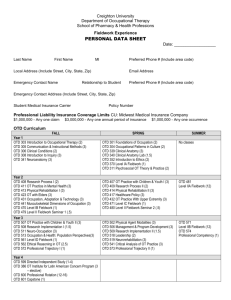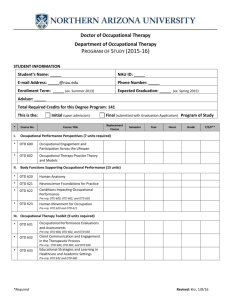First Person Authorization, Learning from Our Own
advertisement
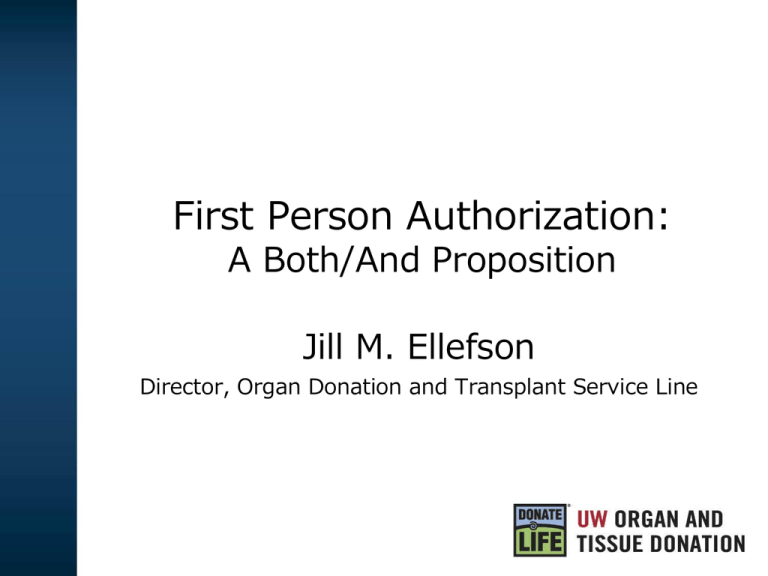
First Person Authorization: A Both/And Proposition Jill M. Ellefson Director, Organ Donation and Transplant Service Line Questions We’re Running On… • What is the background and philosophy of first person authorization (FPA)? • What are the best practices for implementing FPA? • How can I best prepare myself and my colleagues? Either/Or vs. Both/And clearly an either/or proposition… the philosophy of first person authorization is abundant with both/and We advocate for BOTH the donor family AND those on the waiting list We honor BOTH the decision of the patient AND support the donor family We encourage the public to BOTH sign up on the registry AND talk to their family the national data and our local experience supports this Background Since the early days of transplant the law has recognized the right of individuals to control the use of their organs for transplantation after death. The original Uniform Anatomical Gift Act (1968) recognized this: Section 2 (a) Any individual of sound mind and 18 years of age or more may give all or any part of his body for any purposes specified in section 3, the gift to take effect upon death. This was enacted into Wisconsin law in 1971 with modification for family override for donating an entire body for scientific research as s. 155.08(2)(a), Wis. Stat. Thus, the 1971 family override provision did not apply to transplantation or therapy. The entire family override provision was removed when the Wisconsin Anatomical Gift law was amended in 1990. 1989 Wisconsin Act 298, s. 3. Illinois and Michigan state law follows a similar historical path. In the early days of organ donation, it was common practice for transplant centers/OPOs to decline first person donations when the surviving next of kin objected. This was not due to any legal constraint. It was due to the effort to build and maintain public support for transplant. The Transition Public and political support for transplantation has grown. State and federal government have become active supporters of transplantation. CMS and Joint Commission’s mandated requests were one manifestation of this support. Attention has now been focused on removing barriers to donation. First person authorization is being encouraged through mandated inquiries at the time of driving license renewals, donation registries and other means. The 2008 amendments expressly prohibit family override of first person authorization with only one exception for parental override of some donations made by minors. UAGA Enactment Status Source: www.uniformelaws.org First Person Authorization If there is a valid authorization from the individual whose organs are being donated, no other consent is required. If the individual was an adult when making the donation, no one can veto the donation. If the individual was a minor when making the donation, in some circumstance a parent can veto the donation. Authorization by the Individual: 5 Ways to Document What is required for a valid donation by the deceased? 1. 2. 3. 4. 5. Driver’s license or identification card Will Witnessed communication when terminally ill Donor card or record of donation Donor registry Revocation Regarding the registry, individuals can remove their name from the registry via a website, mail, or at the DMV. A reasonable effort needs to be made to contact the person who would be authorized to donate in the absence of first person authorization. The contacted person should be asked if s/he is aware of any revocation or amendment. Revocation If you are told that the gift is amended or revoked then ask for the evidence. If there is none, then the donation remains effective. Note that revocation requires some evidence beyond an assertion that the person changed their mind. First Person Authorization: Best Practices UW OTD/tissue/eye bank personnel are authorized to look up individuals via a website. We will print a certificate from this website as documentation of the authorization. Donor hospital personnel/designated requestors should check with the UW OTD/tissue/eye bank to determine registry status prior to speaking with the family. First Person Authorization: Best Practices First person authorization information can be sought from other states. Transplant/research/education authorization and the ability to document specific limitations varies by state. Ensure clarification prior to speaking with family. The only way to make this a BOTH/AND proposition is to know the registry status of the individual prior to speaking with the family. First Person Authorization: Best Practices Conversation best practices – refer to handout. Recognizing the key role of the DMV: 96% of individuals that join the registry do so at the DMV. FPA CASE STUDIES UW Hospital Ministry St. Joseph’s Hospital UW Hospital FPA Case Study Christy Hunter, RN, BSN, CCRN Pamela Chambers, RN, BSN, CPTC History • • • • Early 20’s male, “John Doe” Rollover trauma/crash Unconscious, spontaneous respirations UW Hospital ED via Med Flight Admission • Head CT = Traumatic brain injury • Sent immediately to OR – left hemicraniectomy, SDH evacuation, EVD placement • Transferred to Neuro ICU • Registry status unknown d/t no middle initial • Determining eligibility to be organ donor begins The Following Morning • • • • • • Obtained first and last names and DOB Deemed non-survivable injury Brain death testing late afternoon Family open to organ donation OPC to determine final eligibility UW OTD to speak with family when appropriate That Same Afternoon • • • • • No brainstem reflexes Mother says “no” to organ donation Received middle initial from nurse Patient is FPA on Wisconsin Registry UW OTD staff to come to UWHC Approach/Consent • Huddle – Within UW OTD – Between UW OTD and hospital staff • Family meeting – Sue, Pamela, NP, RN, patient’s stepfather – Mother refused to attend Approach/Consent (continued) • Conversation – How FPA aligned with patient’s life – Explained not having middle initial • Stepfather’s response – Language: “Coercive,” “scheme,” “persuade” – Asked that UW OTD proceed without further persuasion – Wished to remain unbiased – **Family member listed for heart transplant Next Steps • Huddles – OTD staff, UW hospital staff, UW Risk Management, UW legal department, UW COO • FPA to be upheld – “This isn’t a legal issue; it’s the law.” Moving Forward • ICU Huddle – POC/Assignments – Bedside RN to focus on patient and family support – Nurse Manager and Charge RN to focus on donor management – Charge RN and NP to speak with family • Seek historian for med/soc interview Medical/Social Interview • Father and stepmother – Shared son wanted to be a donor before going to military – Patient convinced grandmother to be donor – Concerned about upsetting patient’s mother – Uncertain about receiving aftercare Into the Evening • Brain death declared overnight – Ordered diagnostics for cardiothoracic (EKG, echo, bronch, O2 challenge) • Family’s distress elevated • UW OTD foregoes further evaluation • OR time set Procurement Outcome • • • • • Kidneys Pancreas Liver Corneas Tissue Family Aftercare • OPC received call from stepmother day of procurement for outcome • Requested aftercare • Attended the Governor’s Ceremony • UW OTD receives letter • Agreed for UW OTD to share their story with all of you today Learning Points 1. Have patient’s full name (+MI) and DOB when making referral 2. Know donor eligibility before approaching family 3. FPA-approaches focus on support, not decision 4. Hospital and UW OTD unified team - Assigned roles vs. bedside RN perceived as “bad guy” Learning Points 5. Reconcile how patient’s life experiences align with being a donor 6. Fully honor the donor’s decision 7. Staffing ratio 2:1 8. UW Leadership supported FPA “A New Day, A New Way for FPA” (because it rhymes) Ministry St. Joseph’s Hospital FPA Case Study Cindy Kolzow, RN, Donation Liaison Ministry St. Joseph’s Hospital - Marshfield Case Background • 42 y.o. male with ruptured esophageal varicies • Day 6: Cerebral Edema lost reflexes but still breathing over vent – Called Statline • Patient had FPA • NOK/father struggling with poor prognosis – “Waiting for a miracle” • Day 8: Approached family about eligibility to donate/FPA and both brain dead (BD) and donation after cardiac death (DCD) possible – Relief: their miracle had come! • Patient progressed to brain death overnight – Great physician response • Day 9: Donated 2 kidneys Key Takeaways • Because FPA was presented from the beginning, approach was easier – Decision made = RELIEF • No burden on family to make/question decision – Tangible memento to keep - Record of Gift • If not brain dead, helpful to outline both BD and DCD What insights have you gained from this presentation that will help you facilitate first person authorization? The Response: “He/She Didn’t Want to Be a Donor” Recognize this statement has several possible meanings: 1) The patient did make this statement, had thought about it in depth and had a deep commitment to not donating. 2) The patient said this in a joking way, as a flippant or fleeting comment as a common defense mechanism about one’s own demise. 3) The patient said this on some occasion but had bad information, ex: thinking he/she was too old to donate. 4) The patient did not say anything about not being a donor but that the family knows that saying that is the fastest way to end the conversation. 5) The voiced objection is that of the family and is put into the deceased patient’s mouth because the family does not want to voice their concern. Verble M, Worth J. Addressing the Unintended Consequences of First Person Consent and Donor Registries. Progress in Transplantation. 2012; 22(1) The Response: “He/She Didn’t Want to Be a Donor” “He said he didn’t want to be a donor.” “So he was against donation, is that correct?” “No, he wasn’t against donation, he just didn’t think it was for him.” “I don’t quite understand that. Could you tell me a little more about his feelings?” Guess at the underlying emotion or assumption “So you think he was worried about the operation itself?” “A lot of people have that concern. I can see why he might worry about that. Let me tell you what actually happens so you’ll know.” Verble M, Worth J. Addressing the Unintended Consequences of First Person Consent and Donor Registries. Progress in Transplantation. 2012; 22(1) A word about timing... • Beyond the FPA scenario, the data shows a significant trend of no consents with the underlying concern being timing. • In a true patient and family-centered care model, we as providers should be building our processes and workflows to meet the patient and family needs. Best Practices for Addressing Timing Recognize that timing expectations begin very early in the patient/family experience. When end of life decisions are imminent, some families are already thinking about next steps. The donation discussion may be happening too late in the process and/or the family’s timing expectations for withdrawal of life-sustaining therapies has not been inclusive of timing for donation. – “What are your needs regarding timing? Let me work with our team on that and come back with the details.” – Ask UW OTD to speak directly with the family about timing and process. – Ensure a mutually agreed upon communication plan between the UW OTD coordinator and nurse so everyone is apprised of progress during coordination. Proactively share updates with the family. – Utilize the “Phases of Donation” handout as needed. Our Commitment...


